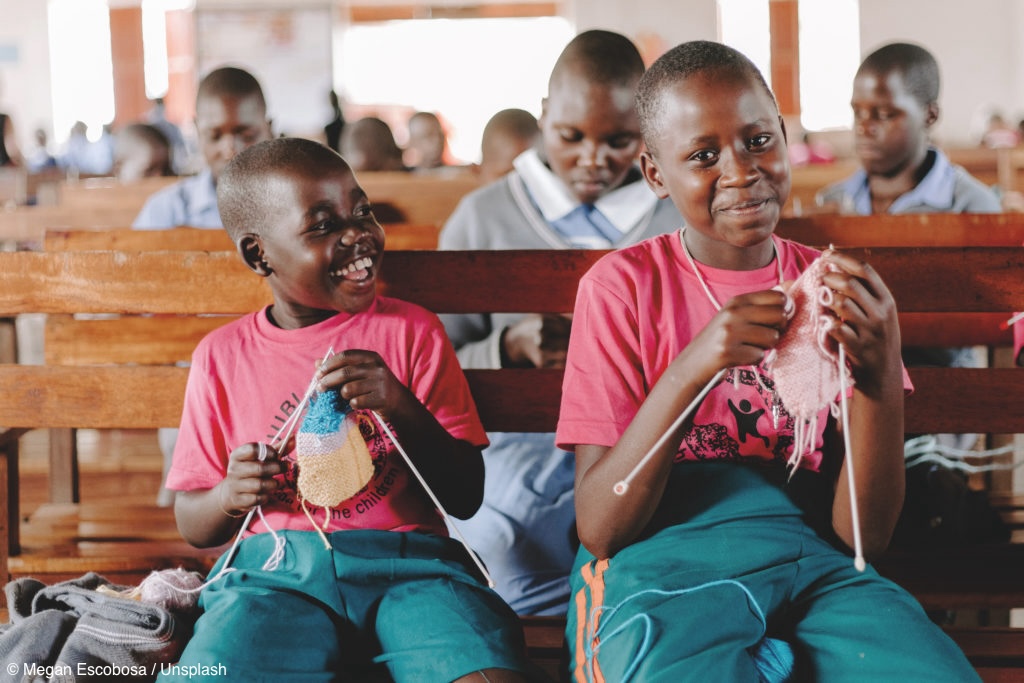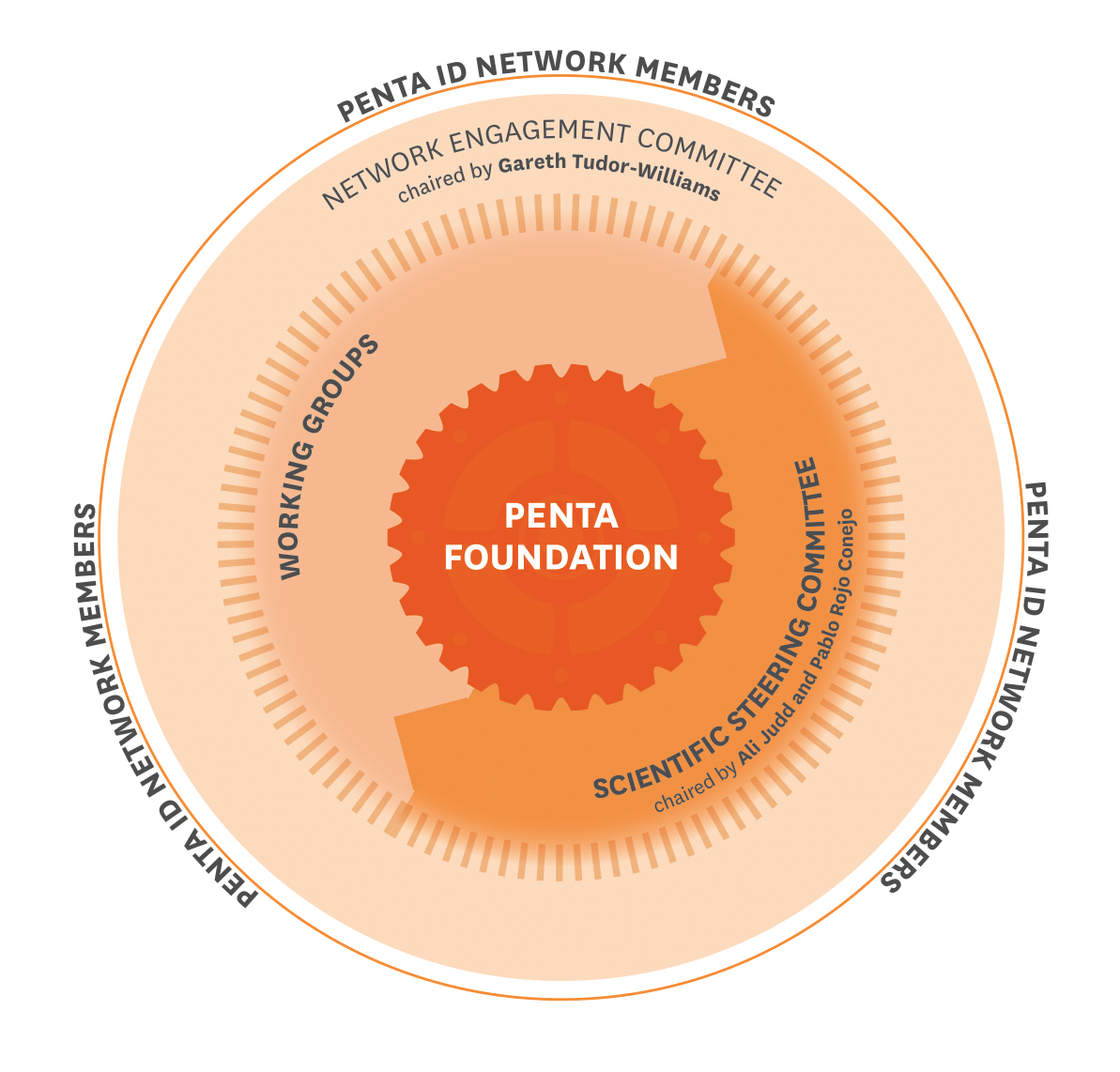More than 30 years since its creation, Penta is today one of the most prominent scientific organisations dedicated to paediatric research. We are an international, independent, scientific collaboration devoted to advancing research on optimising the prevention and management of infections in pregnancy, infancy, childhood and adolescence.

Our vision is for a world where the health needs of pregnant people, infants, children and adolescents are always prioritised.
Our mission is to be an inclusive network that delivers impactful research to improve the prevention and management of infections in pregnancy, infancy, childhood and adolescence globally.
We are focused on developing scientific evidence to inform guidelines, policies and practice, accelerated through strategic partnerships, especially in countries where there is the greatest need. Penta advocates for equitable access to healthcare across all activities and strives to engage with affected and at risk communities to maximise impact.
How we’re structured
The Penta governance structure has been designed to ensure transparency and cohesive reporting lines across all of Penta’s activities. It also aims to support the expansion of the Penta ID Network, so that we can ensure we are building a Network that is truly built to last.
Click on any image area below to learn more about our governance bodies.

Penta Foundation
The Penta Foundation was set up in 2004 as the coordinating centre to support activities related to research on HIV and other paediatric infectious diseases. As a leading organisation in paediatric research, the Foundation collaborates with the Penta ID Network – an international network of scientists, researchers, and healthcare professionals. Together, they strive to considerably reduce the frequency and consequences of infectious diseases in children and in pregnancy.
Moreover, the Board of Directors is responsible for ensuring that the Penta Foundation operates in accordance with its mission and values. Board members serve three-year terms.
Scientific Steering Committee
The Scientific Steering Committee serves a vital role in fostering a coordinated approach across Penta’s working groups and clinical areas. The Committee is formed of the leads from each Penta working group and regional representatives from Africa, Asia and Latin America to offer a platform for brainstorming, a unified approach to new and ongoing projects, supporting the coordination of initiatives and serving as a forum to address issues, risks and share updates and opportunities.
- Co-chairs: Ali Judd and Pablo Rojo
Members: - Working Group co-chairs: Adilia Warris, Al Ozonoff, Alasdair Bamford, Alfredo Tagarro, Angela Dramowski, Anna Turkova, Catherine Wedderburn, Costanza Di Chiara, Eric Decloedt, Jeannie Collins, Lisanne Bevers, Nicola Cotugno, Steve Welch, Tim Cressey, Tisungane Mvalo
- Regional representatives: Damalie Nalwanga (Africa), Hilda Angela Mujuru (Africa), Thanyawee Puthanakit (Asia), Tatiana Drummond (Latin America)
- Network Engagement Committee chair: Gareth Tudor-Williams
- Board of Directors representative: Claire Thorne
- Penta Foundation representative: Laura Mangiarini
Working Groups
Arising from Penta’s key scientific priorities, Penta’s working groups lead the development of new research concepts, training programmes and activities in each of the key scientific areas. Working groups are made up of Penta ID Network members working together to achieve specified goals.
Network Engagement Committee
The Network Engagement Committee (NEC) is responsible for ensuring member engagement by designing and implementing initiatives that promote interaction and collaboration. They also manage membership applications and track the Network’s expansion, ensuring its continued growth.
- Chair: Gareth Tudor-Williams
Penta ID Network members
The Penta ID Network forms the foundation of Penta’s work. With the skills, experience and expertise of all our Network members, we develop and deliver world class research and training to drive understanding and good practice around the management of infections in children, young people and pregnant people.
Our history
Our journey is one of continuous progress. We began thirty-two years ago, driven by a shared passion among scientists: ensuring no child is left behind in the fight against HIV/AIDS. Today, this passion has ignited a global network, extending beyond HIV to address a wider spectrum of infectious diseases.

In 1991, the Paediatric European Network for Treatment of AIDS (PENTA) emerged as a collaborative effort between European paediatric HIV centres. Its primary focus was conducting independent clinical trials specifically tailored for children, complementing existing research efforts.
As the Network’s scope grew beyond HIV clinical trials and observational studies, Penta evolved into an ideal platform for fostering and supporting research and training activities. This pivotal moment gave birth to the Penta Foundation.
Recognising the neglect of other childhood infections, the Paediatric European Network for Treatment of AIDS transitioned into Penta ID (Infectious Diseases) in 2011. This shift broadened research endeavours (both clinical and basic) to encompass a wider range of paediatric infectious diseases.
With the growing threat of antimicrobial resistance, Penta has developed an ambitious and unique research agenda tackling critical questions surrounding treatment and prevention for newborns and children.
The fight against COVID-19 became a crucial focus in 2021. Aligning with our core scientific strategy, we mobilised our Network members and collaborators to investigate the impact of SARS-CoV-2 on maternal and child health. This initiative reflects our unwavering belief that only through joining our resources and experience with partners can we advance our knowledge and inform effective virus control strategies.
In 2022, we not only consolidated our collaborative effort to advance the treatment and care of COVID-19, but we also expanded the scope of our research to mpox. This expansion aimed to build research preparedness for future emerging pathogens with pandemic potential, harnessing the power of real word data.
The year 2023 saw the establishment of the Penta research environment, designed for centralised coordination and the support of all ongoing research activities.
As we solidify our position as the leading experts in maternal and child health research, the values and behaviours that underpin our work will continue to guide us.

